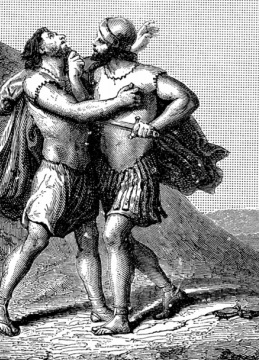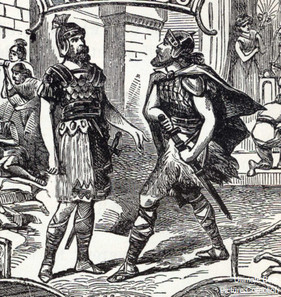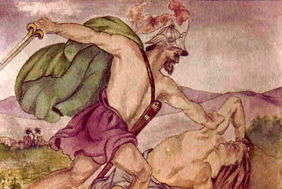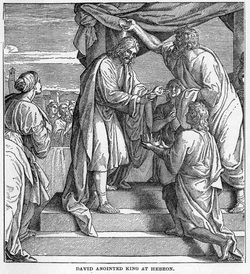
With so many of our regular Bible study participants out of town during one week of our 2 Samuel series, these posts by Pastor Rob served as our background information:
So far, David has show kindness to the northern Israelites who buried Saul, to Abner and the men of northern Israel even after the death of Asahel, and to Ish-Bosheth in the peace covenant. Having read 1 Samuel (and in particular about the Amalekite who killed Saul in 1:1-16), what did you predict David would say and do to the ones who killed Ish-Bosheth? David doesn't take kindly to those who take things into their own (often bloody) hands and David is once again innocent of this killing (see Joab and Abner).
To further the pain of inter-tribal conflict, Ish's assassins are his own Benjaminite kin. The additional mention of Mephibosheth reminds readers that Ish's death does not end succession claims to Saul's throne. It also foreshadows David's further expressions of covenant kindness.
In the NRSV, Ish-Bosheth is referred to as Ishbaal, and similarly, Mephibosheth is referred to as Meribaal in 1 Chronicles 8-9. Many scholars believe that Scripture editors were offended by the pagan name "baal" within the royal lineage. They substituted the Hebrew word "bosheth", which means "shame" into where the idolatrous word "baal" had been.
For application:
This story is the last in a series of narratives involving power and violence. It is tempting to want to describe David as a pious perfectionist. However, he was greatly tempted at times to assert his power through violence, and we have seen others in these narratives succumb to such temptations. Yet he adhered to his Godly integrity. It is also tempting to assert that within the current halls of power there resides few if any people of Godly integrity. Both of these assertions need to be resisted.
These narratives do also remind us that violence is never far removed from power. The human impulse to aggregate power, to amass control, to inject such power into people's lives in all sorts of ways must always be tempered. Faithful leadership reflects God's desire to liberate, to free, and to give power away so that others may more freely live. Ultimately it is God who liberates; our role, as is David's, is to seek God's heart, to seek to follow what God desires in our leadership and in our service, to limit aggregating power and violence, and to promote human worth, dignity, and freedom.
What are your thoughts?
So far, David has show kindness to the northern Israelites who buried Saul, to Abner and the men of northern Israel even after the death of Asahel, and to Ish-Bosheth in the peace covenant. Having read 1 Samuel (and in particular about the Amalekite who killed Saul in 1:1-16), what did you predict David would say and do to the ones who killed Ish-Bosheth? David doesn't take kindly to those who take things into their own (often bloody) hands and David is once again innocent of this killing (see Joab and Abner).
To further the pain of inter-tribal conflict, Ish's assassins are his own Benjaminite kin. The additional mention of Mephibosheth reminds readers that Ish's death does not end succession claims to Saul's throne. It also foreshadows David's further expressions of covenant kindness.
In the NRSV, Ish-Bosheth is referred to as Ishbaal, and similarly, Mephibosheth is referred to as Meribaal in 1 Chronicles 8-9. Many scholars believe that Scripture editors were offended by the pagan name "baal" within the royal lineage. They substituted the Hebrew word "bosheth", which means "shame" into where the idolatrous word "baal" had been.
For application:
This story is the last in a series of narratives involving power and violence. It is tempting to want to describe David as a pious perfectionist. However, he was greatly tempted at times to assert his power through violence, and we have seen others in these narratives succumb to such temptations. Yet he adhered to his Godly integrity. It is also tempting to assert that within the current halls of power there resides few if any people of Godly integrity. Both of these assertions need to be resisted.
These narratives do also remind us that violence is never far removed from power. The human impulse to aggregate power, to amass control, to inject such power into people's lives in all sorts of ways must always be tempered. Faithful leadership reflects God's desire to liberate, to free, and to give power away so that others may more freely live. Ultimately it is God who liberates; our role, as is David's, is to seek God's heart, to seek to follow what God desires in our leadership and in our service, to limit aggregating power and violence, and to promote human worth, dignity, and freedom.
What are your thoughts?




 RSS Feed
RSS Feed